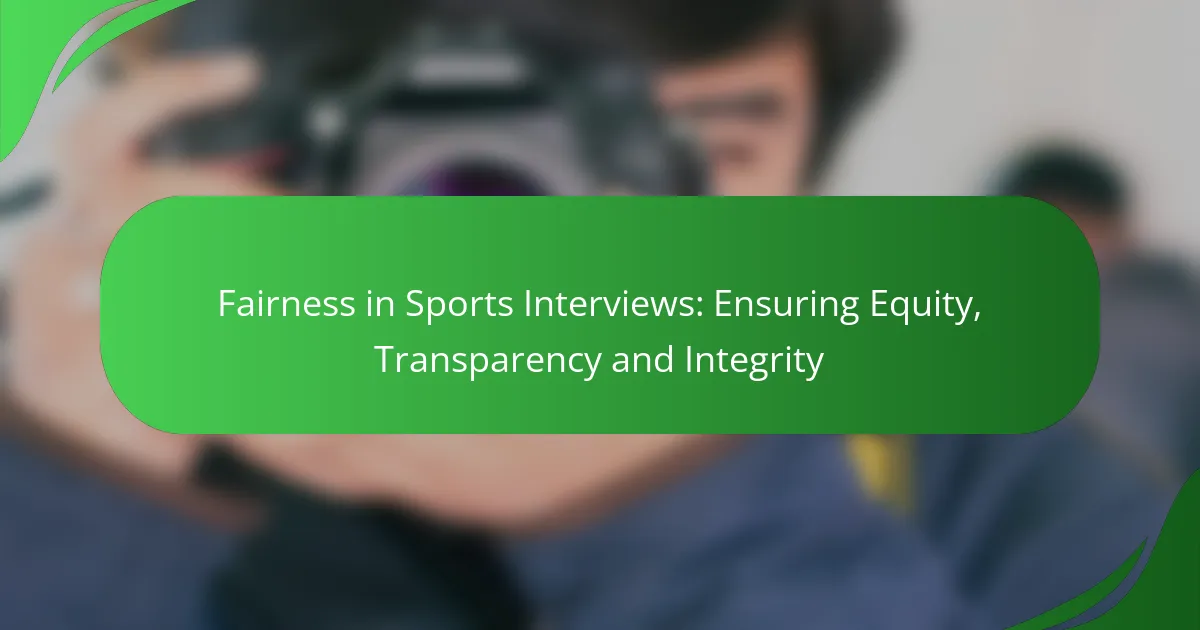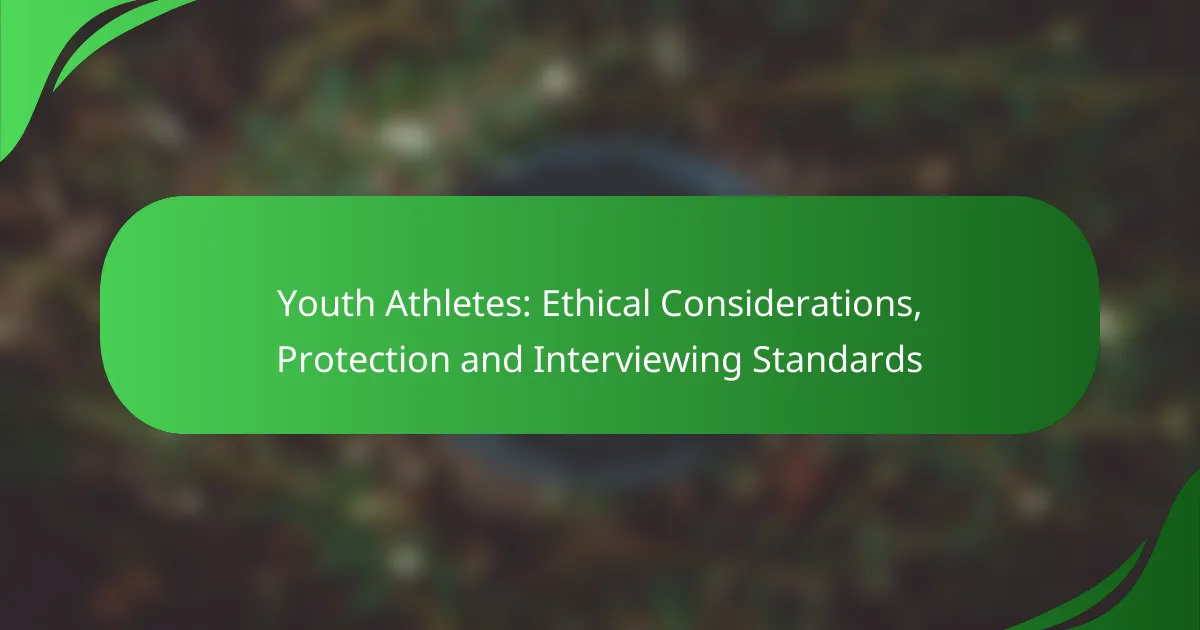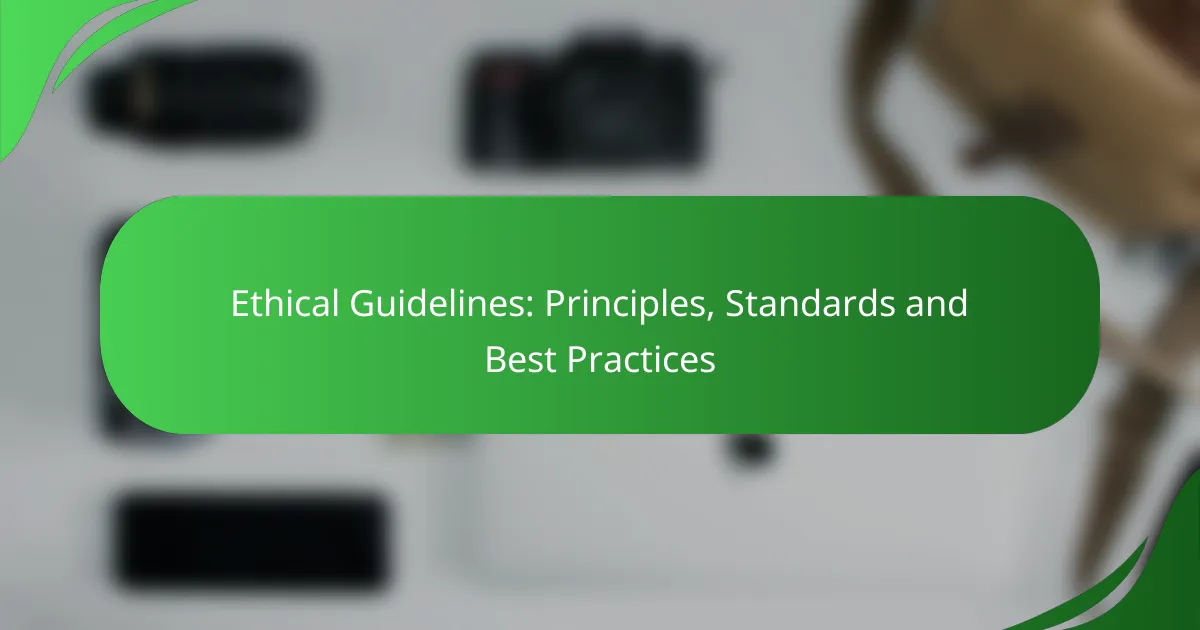Ensuring fairness in sports interviews is crucial for promoting equity, transparency, and integrity within the sporting community. By implementing standardized protocols and providing bias awareness training for interviewers, the interview process can be made more reliable and just. These efforts not only respect the rights of all athletes but also foster trust and accountability among participants and audiences alike.
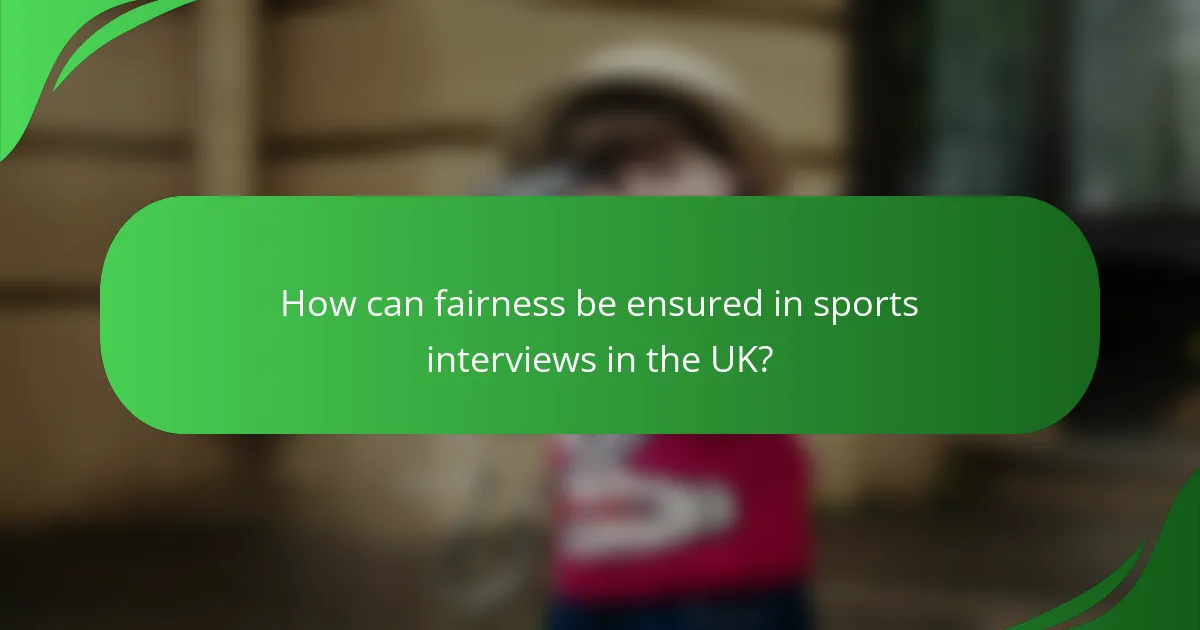
How can fairness be ensured in sports interviews in the UK?
Fairness in sports interviews in the UK can be ensured through standardized protocols, bias awareness training for interviewers, and third-party oversight. These measures promote equity, transparency, and integrity in the interview process, ultimately leading to more reliable and fair outcomes.
Implementing standardized interview protocols
Standardized interview protocols help create a consistent framework for conducting interviews, ensuring that all athletes are treated equally. These protocols should outline specific questions, response evaluation criteria, and time limits to minimize variability in the interview process.
For example, using a fixed set of questions for all interviewees can prevent favoritism and ensure that each athlete has the same opportunity to express their views. Regular reviews and updates of these protocols can help maintain their relevance and effectiveness.
Training interviewers on bias awareness
Training interviewers on bias awareness is crucial for promoting fairness in sports interviews. This training should focus on identifying and mitigating personal biases that may influence questioning or interpretation of responses.
Workshops and seminars can be organized to educate interviewers about common biases, such as confirmation bias or stereotype threat. Role-playing scenarios can also be effective in helping interviewers practice recognizing and addressing their biases in real-time.
Utilizing third-party oversight
Involving third-party oversight in sports interviews can enhance fairness by providing an impartial perspective. Independent observers can monitor interviews to ensure adherence to established protocols and identify any potential biases in the process.
Organizations may consider appointing external auditors or forming advisory committees to review interview practices regularly. This oversight can help maintain accountability and build trust among athletes, ensuring that the interview process remains fair and transparent.

What are the key principles of equity in sports interviews?
The key principles of equity in sports interviews include fairness, transparency, and equal access for all athletes. These principles ensure that interviews are conducted in a manner that respects the rights and dignity of every participant, fostering an environment of integrity and trust.
Transparency in questioning
Transparency in questioning means that interviewers should ask clear and relevant questions that are understandable to all athletes. This approach helps eliminate biases and ensures that athletes are aware of the topics being discussed, allowing them to prepare adequately.
Interviewers should provide context for their questions, explaining why certain topics are being addressed. This practice not only builds trust but also encourages athletes to engage more openly in the conversation.
Equal opportunity for all athletes
Equal opportunity for all athletes ensures that every participant has the same chance to express their views and experiences during interviews. This can be achieved by scheduling interviews at accessible times and locations, as well as providing necessary accommodations for athletes with disabilities.
Additionally, interviewers should strive to include a diverse range of athletes in their discussions, representing various backgrounds, genders, and sports. This inclusivity enriches the dialogue and promotes a more comprehensive understanding of the issues faced in sports.

How does transparency impact sports interviews?
Transparency in sports interviews fosters trust and accountability between athletes, interviewers, and audiences. When interview processes are open and clear, it enhances the integrity of the information shared, leading to a more informed public perception of the sport.
Building trust with audiences
Trust is essential for maintaining a loyal audience base in sports. When interviews are conducted transparently, audiences feel more confident in the authenticity of the information presented. This can be achieved by openly sharing the interview process, including how questions are selected and how responses are framed.
For example, providing context about the interviewer’s background or the criteria for selecting athletes can help audiences understand the motivations behind the questions. This transparency can lead to increased engagement and support from fans.
Enhancing athlete cooperation
Transparent interviews can significantly improve cooperation from athletes. When athletes know that the interview process is fair and open, they are more likely to share their thoughts and experiences candidly. This openness can lead to richer, more insightful conversations that benefit both the athlete and the audience.
To encourage cooperation, interviewers should communicate their intentions clearly and respect the athletes’ boundaries. For instance, informing athletes about the topics to be discussed beforehand can help them prepare and feel more comfortable during the interview.

What role does integrity play in sports interviews?
Integrity is crucial in sports interviews as it ensures that the information shared is accurate, fair, and respectful to all parties involved. Upholding integrity fosters trust between interviewers, athletes, and audiences, ultimately contributing to the credibility of the sport.
Maintaining ethical standards
Maintaining ethical standards in sports interviews involves adhering to principles that promote honesty and fairness. Interviewers should avoid conflicts of interest and ensure that their questions do not lead to biased or misleading responses. For instance, framing questions neutrally helps prevent influencing the athlete’s answers.
Additionally, organizations often have codes of conduct that outline acceptable practices for interviews. Familiarity with these guidelines can help interviewers navigate ethical dilemmas effectively, ensuring that they respect the dignity of the athletes while providing valuable insights to the audience.
Accountability for interviewers
Accountability in sports interviews means that interviewers must take responsibility for their actions and the content they produce. This includes being transparent about their sources and the context of the questions asked. Interviewers should be prepared to address any backlash or criticism regarding their interview techniques or the information shared.
To enhance accountability, media outlets can implement review processes where interviews are evaluated for fairness and integrity. This could involve peer reviews or audience feedback mechanisms, which can help maintain high standards and improve the quality of sports journalism.

What frameworks support fair sports interviews?
Fair sports interviews are supported by various frameworks that emphasize equity, transparency, and integrity. These frameworks include guidelines from sports governing bodies and best practices established by media organizations, ensuring that interviews are conducted in a manner that respects all participants and promotes honest dialogue.
Guidelines from sports governing bodies
Sports governing bodies, such as FIFA and the International Olympic Committee, provide specific guidelines to ensure fairness in interviews. These guidelines often include protocols for equal access to athletes, ensuring that all media representatives have the same opportunity to conduct interviews.
Additionally, these organizations may enforce regulations that prohibit discriminatory practices in interviews, such as favoritism towards certain media outlets or biased questioning. Adhering to these guidelines helps maintain the integrity of the sport and the interview process.
Best practices from media organizations
Media organizations have developed best practices to promote fairness in sports interviews, focusing on transparency and ethical reporting. These practices often include training for journalists on how to conduct interviews that are respectful and unbiased, ensuring that all voices are heard.
Furthermore, media outlets may implement policies that require journalists to disclose any potential conflicts of interest, fostering trust between interviewers and interviewees. By following these best practices, media organizations contribute to a more equitable and transparent interview environment in sports.

How can technology improve fairness in sports interviews?
Technology can enhance fairness in sports interviews by providing tools that promote equity, transparency, and integrity. By leveraging advanced analytics and artificial intelligence, organizations can identify biases and improve the overall interview process.
AI-driven bias detection tools
AI-driven bias detection tools analyze interview content to identify potential biases in questions and responses. These tools can flag language that may favor certain athletes or perspectives, ensuring a more balanced approach to interviews.
For example, a tool might highlight questions that disproportionately focus on an athlete’s background or personal life rather than their performance. Implementing these tools can help interviewers craft more neutral questions, fostering an environment of fairness.
Data analytics for interview performance
Data analytics can assess the performance of interviews by tracking metrics such as question variety, response length, and athlete engagement. This analysis helps identify patterns that may indicate bias or favoritism in the interview process.
For instance, if data shows that certain athletes receive significantly more questions or longer interview times, organizations can adjust their practices to ensure all athletes are treated equitably. Regularly reviewing these analytics can lead to continuous improvement in interview standards.
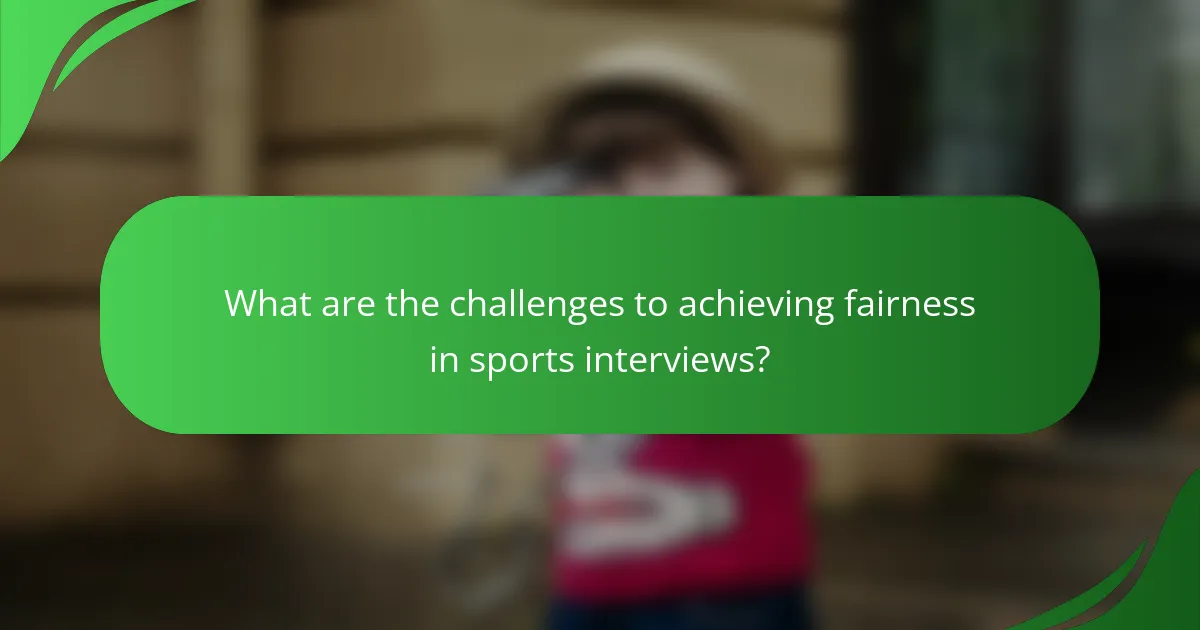
What are the challenges to achieving fairness in sports interviews?
Achieving fairness in sports interviews faces several challenges, including biases in media representation and external pressures from sponsors and stakeholders. These factors can compromise the integrity and transparency of the interview process, leading to unequal treatment of athletes.
Pre-existing biases in media
Media outlets often have pre-existing biases that can influence how athletes are portrayed during interviews. These biases may stem from factors such as race, gender, or past controversies, affecting the questions asked and the narratives presented. For instance, female athletes might face more scrutiny regarding their appearance or personal lives compared to their male counterparts.
To combat these biases, media professionals should strive for objectivity by focusing on athletes’ performances and achievements rather than personal attributes. Training on diversity and inclusion can help journalists recognize and mitigate their biases, ensuring a more equitable interview process.
Pressure from sponsors and stakeholders
Sponsors and stakeholders can exert significant pressure on media coverage and interviews, potentially compromising fairness. This pressure may lead to selective questioning or the omission of critical issues that could affect the sponsor’s image. For example, an athlete facing a scandal might receive softer questions to protect the interests of their sponsors.
To maintain integrity, media organizations should establish clear guidelines that prioritize journalistic ethics over commercial interests. Transparency about sponsorships and potential conflicts of interest can help audiences better understand the context of the interviews and the motivations behind them.
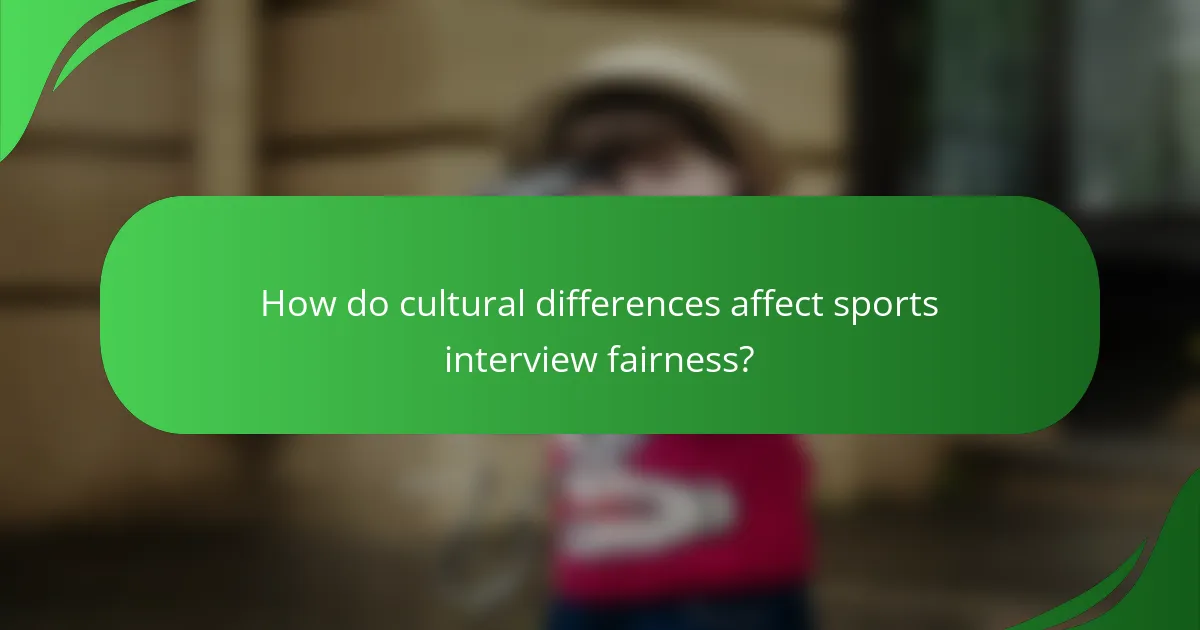
How do cultural differences affect sports interview fairness?
Cultural differences significantly impact the fairness of sports interviews by influencing communication styles, expectations, and perceptions of equity. Understanding these variations is crucial for ensuring that interviews are conducted transparently and with integrity across diverse backgrounds.
Communication Styles
Different cultures have distinct communication styles that can affect how questions are interpreted and answered in sports interviews. For instance, some cultures may prioritize indirect communication, leading athletes to provide more nuanced responses, while others may favor directness, resulting in straightforward answers. Interviewers must be aware of these differences to avoid misinterpretations.
To enhance fairness, interviewers should adapt their questioning techniques based on the cultural context of the athlete. Using open-ended questions can encourage more comprehensive responses, while being mindful of non-verbal cues can help gauge comfort levels during the interview.
Expectations of Equity
Cultural backgrounds shape athletes’ expectations regarding fairness and respect during interviews. In some cultures, there may be a strong emphasis on hierarchy and authority, which can influence how athletes respond to questions from interviewers perceived as having more power. This dynamic can lead to imbalances in the interview process.
To promote equity, interviewers should establish a rapport with athletes before the interview, ensuring they feel valued and respected. This can involve acknowledging cultural norms and demonstrating an understanding of the athlete’s background, which fosters a more balanced dialogue.
Perceptions of Integrity
The perception of integrity in sports interviews varies across cultures, affecting how athletes view the interview process. In cultures where transparency and honesty are paramount, athletes may be more willing to share their thoughts openly. Conversely, in cultures where skepticism towards authority is prevalent, athletes may withhold information or provide guarded responses.
Interviewers can enhance perceptions of integrity by being transparent about the interview’s purpose and how the information will be used. Clearly communicating the intent behind questions can help build trust and encourage athletes to engage more fully in the conversation.
